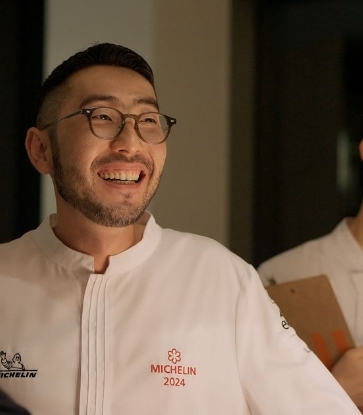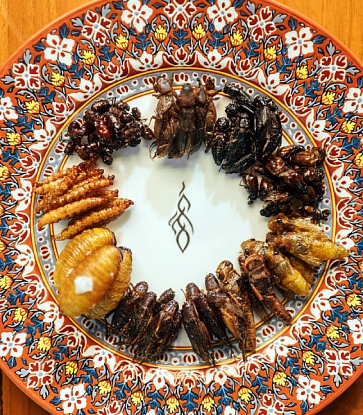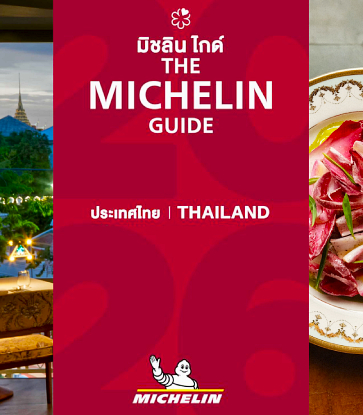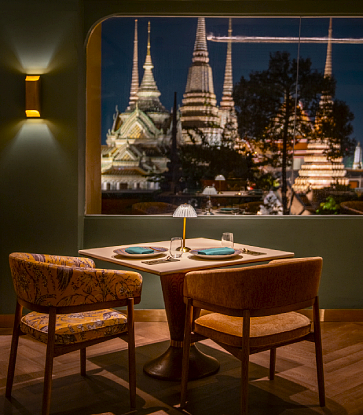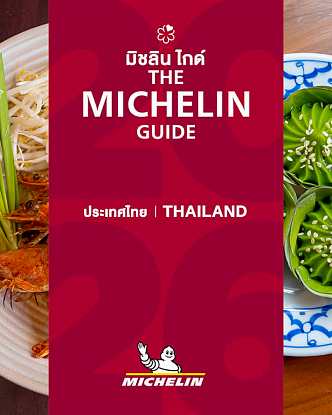During the MICHELIN Guide Seoul & Busan Ceremony, the fourth recipient of the MICHELIN Mentor Chef Award was announced, aiming to highlight the dedication and influence of mentor chefs who serve as industry role models. Chef Hu Deok-juk, a master of Chinese cuisine who has devoted more than half a century to culinary excellence and has mentored numerous aspiring chefs, was chosen for this prestigious award.

Wonho Choi, the brand manager of Blancpain Korea, the official sponsor of the MICHELIN Mentor Chef Awards, delivered a congratulatory speech for Chef Hu Deok-juk's achievement. "Blancpain and the MICHELIN Guide share a common goal. Founded in 1735 with a rich history, Blancpain also prioritizes the art of living as a fundamental value, mirroring the MICHELIN Guide's ethos of respect for craftsmanship, history, perfection, creativity, and passion. As MICHELIN's global partner, Blancpain extends heartfelt congratulations to Chef Hu Deok-juk on his well-deserved recognition."
When discussing Chef Hu's expertise in Chinese cuisine, it's impossible to overlook the praise bestowed by then-President Jiang Zemin during his visit to Korea in 1994. The vivid admiration from such an iconic figure isn't merely an anecdote; it continues to resonate, garnering appreciation from many who have experienced Chef Hu's culinary creations. Leading the "Haobin" Chinese restaurant at the Ambassador Seoul Pullman Hotel in Jangchung-dong since 2022, Chef Hu has showcased his culinary prowess to Chinese VIP guests visiting Korea, as well as to a diverse array of gourmets and patrons seeking distinctive flavors. Haobin, under Chef Hu's guidance, was also honored this year as a newly minted one-star restaurant, further affirming his culinary prowess and dedication to his craft.

Congratulations on winning the MICHELIN Mentor Chef Award.
Thank you. Receiving the Mentor Chef Award from the MICHELIN Guide is truly an honor. It's a recognition of not just my culinary skills but also my dedication to preserving and evolving traditional Chinese cuisine. I see it as a testament to my journey of self-improvement and my commitment to upholding our cultural heritage beyond personal success.It sounds like you've put in a lot of hard work to reach this point. Can you tell us about your journey in the culinary world?
Absolutely. It's been a challenging yet fulfilling journey so far. I've worked tirelessly to blend tradition with innovation, striving to create unique flavors while staying true to our culinary roots. Balancing originality with tradition is no easy feat. It requires dedication to achieving the best flavors and earning recognition from our patrons. And it's not something I've done alone; it's been a collaborative effort with chefs from diverse backgrounds coming together to push boundaries and elevate our craft. My hope is that this award inspires young chefs to pursue their dreams fearlessly and break down barriers in the kitchen.
Going back in time, could you share with us your early experiences in the kitchen?
Ah, the 1960s. That's when I first stepped into the world of cooking. I remember it like it was yesterday. I started out at a grill restaurant in a hotel, recommended by a family friend. Although I initially had my sights set on Chinese cuisine, fate led me to "Yonggung," a renowned Chinese restaurant at the Bando Hotel in Sogong-dong. It was the epitome of excellence, with chefs hailing from Taiwan and specializing in Sichuan cuisine. I was determined to learn from them, even offering to work for free. After being rejected twice, I finally got my foot in the door on my third attempt. I was 21 at the time. It felt like a scene out of a martial arts movie, where the aspiring student must prove their worthiness to the master. I started off doing menial tasks, earning their trust bit by bit. It was a tough three months of unpaid work, handling everything from floor cleaning to laundry for the chef. But that's how I earned my stripes and gradually began my apprenticeship in Chinese cuisine. 
Can you tell us about the mentors who have influenced you throughout your career?
Early on, I had the opportunity to travel to Japan, where my sister resided. While there, I was struck by the diversity of Chinese cuisine being offered in Japanese restaurants, something I hadn't experienced in Korea. With my sister's assistance, I humbly entered the kitchen of a Chinese restaurant in Japan, starting from the ground up. Despite not disclosing my prior cooking experience in Korea, I immersed myself in learning the fundamentals, even while carrying out tasks like sweeping and scrubbing floors.During this time, I had the privilege of learning from Chef Kwang, a seasoned chef from mainland China. He not only taught me cooking techniques but also instilled in me the right attitude and mindset essential for success in the kitchen. From mastering the basics of Cantonese cuisine to understanding ingredient selection and recipe intricacies, Chef Kwang laid the groundwork for my culinary journey. His teachings shaped me into a chef capable of maintaining composure even in the most challenging kitchen environments.
After three enriching years in Japan, I returned to Seoul in 1977. Armed with newfound proficiency in both Japanese and culinary arts, I secured a position at the Shilla Hotel, which was then in collaboration with the Okura Hotel. It was a pivotal moment in my career, marking my transition into the professional culinary world back home.
One mentor who continues to play a significant role in my life is Chef Hu, whom I met during a visit to Beijing. Despite the rarity of sharing the same last name, we bonded over our shared passion for the culinary arts. Over the years, Chef Hu has generously shared his wealth of knowledge, from traditional recipes to the rich history and culinary traditions of the Chinese imperial court. Our ongoing friendship and exchange of ideas continue to enrich my understanding of Chinese cuisine.
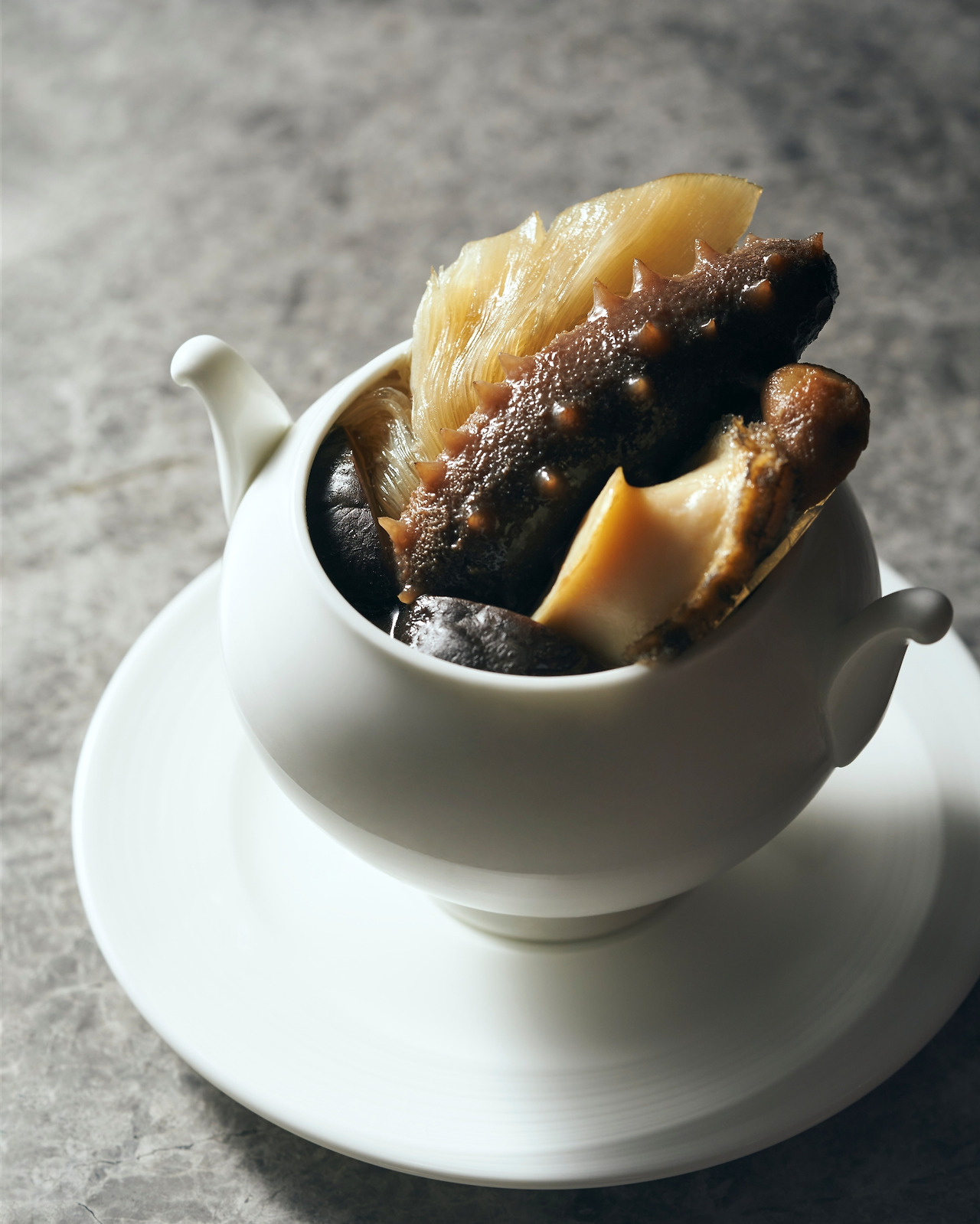
How would you describe your cooking style?
In Cantonese cuisine, preserving the natural flavors of fresh ingredients is paramount. We primarily utilize steaming and gentle cooking methods to highlight the essence of each ingredient. I'm adamant about dispelling the misconception that Chinese cuisine is inherently heavy and artificial. Through continuous experimentation, I've strived to achieve a distinctive umami taste using only natural ingredients.My culinary journey has led me to develop secret recipes based on dried fish, various mushrooms, anchovies, and shellfish, allowing me to create flavorful dishes without relying on chemical seasonings. At the core of my cooking philosophy lies the belief that "medicine and food have the same source." This principle guides everything we do at Haobin, emphasizing the importance of maintaining health through the food we consume.
What has driven you to commit to a single profession for over half a century?
I believe it's the dedication to consistently delivering exceptional food. This commitment has fostered a loyal clientele who have been dining with us for decades. Hearing their words of encouragement and support after witnessing my dedication for over 50 years has been incredibly rewarding. Each day, I renew my pledge to offer dishes that exceed expectations.As I continue my culinary journey, particularly at Haobin, I approach each menu with meticulous care, as if it were my final act on the culinary stage. Drawing inspiration from Korean, Western, and various other cuisines, I'm constantly exploring new flavors and harmonies. Even during leisure outings with my wife, I find myself gravitating towards food stores, studying market trends and ingredient offerings.
You're renowned for personally overseeing the kitchen. What significance does cooking hold for you?
Maintaining my presence in the kitchen has been a priority for me in recent years. While it may seem like just another meal to the diner, for me, cooking is life itself. Handling sharp tools and navigating scorching flames requires skill and focus, yet it brings me immense joy. The endless possibilities of creating diverse dishes using the same ingredients never fail to excite me.The culinary world is vast and ever-evolving. Despite decades of experience, I still encounter ingredients and techniques that challenge me. Delving into the history and origins of ingredients and crafting innovative dishes brings me unparalleled satisfaction. Being able to bring joy to diners through my creations is a privilege that I cherish deeply.
When I step into the kitchen each day, I begin by reviewing reservations and discussing feedback from previous guests with my team. Ten minutes before opening, we gather for a briefing to ensure we're fully prepared to meet the unique needs of each diner. Throughout service, I personally taste each dish before it leaves the kitchen. While many regulars come to see me, this meticulous attention to detail is my way of honoring the trust they've placed in me. It's this dedication to quality and customer satisfaction that drives me to remain hands-on in the kitchen.
What do you consider the most important virtue for a chef?
There's no retirement age for a chef. It takes individual effort and determination to endure the long hours and immense responsibility that comes with leading a kitchen. Beyond cooking skills, a chef needs to possess traits like creativity, innovation, leadership, teamwork, stress management, and a commitment to continuous learning and growth. It's not just about achieving greatness; it's about sustaining excellence over the long haul, with a multitude of virtues.Do you have a memorable junior chef from your past experiences?
One junior chef who stands out is Soogeun Choi, now the director of the Korean Cooking Museum. He worked alongside me in the main kitchen of my previous workplace, demonstrating exceptional skill and dedication in preparing meals and managing events. Today, he's a professor of culinary management at Kyunghee University's Hotel and Tourism University, where he's passionate about mentoring aspiring chefs and preserving our culinary heritage through the museum. I find his dedication truly admirable, and he embodies the essence of a chef.Is there any advice you'd like to share with your junior chefs?
I've always believed that being a good human being precedes being a good chef. A clean mind is essential for delivering quality food to customers. Reflecting on my own experience, I vividly remember a painful mistake I made 50 years ago. As the youngest chef in the kitchen, I attempted to make sweet and sour pork while my seniors were away. With a mix of eagerness to prove myself and a dash of pride, I ended up ruining the dish by adding salt instead of sugar. It was a humbling experience, nearly resulting in my expulsion from the kitchen. However, it taught me a valuable lesson about patience, humility, and the importance of following procedures diligently. I often remind my junior chefs that every skill has its stages, and it's crucial to learn step by step without rushing or cutting corners.
What are your future plans?
My vision is to establish an authentic Chinese restaurant at Haobin, where guests can savor the four major Chinese cuisines, with a foundation rooted in Cantonese culinary traditions. The name "Haobin" itself signifies serving esteemed guests, and I find immense satisfaction in seeing people enjoy the carefully crafted dishes.To me, being a chef is akin to a doctor treating patients; instead of medicine, I use food to promote health and happiness. I don't harbor lofty ambitions or aspirations at this stage of my career. I've already experienced and achieved a great deal. Now, my focus is on imparting my skills to the next generation of chefs and supporting their growth.
Perhaps this will be my final culinary endeavor, but I see it as an opportunity to continue evolving alongside my colleagues and junior chefs. I envision Haobin as a place where delicious dishes crafted by someone named Hu Dek-juk can be savored, fostering a legacy of culinary excellence for years to come.






